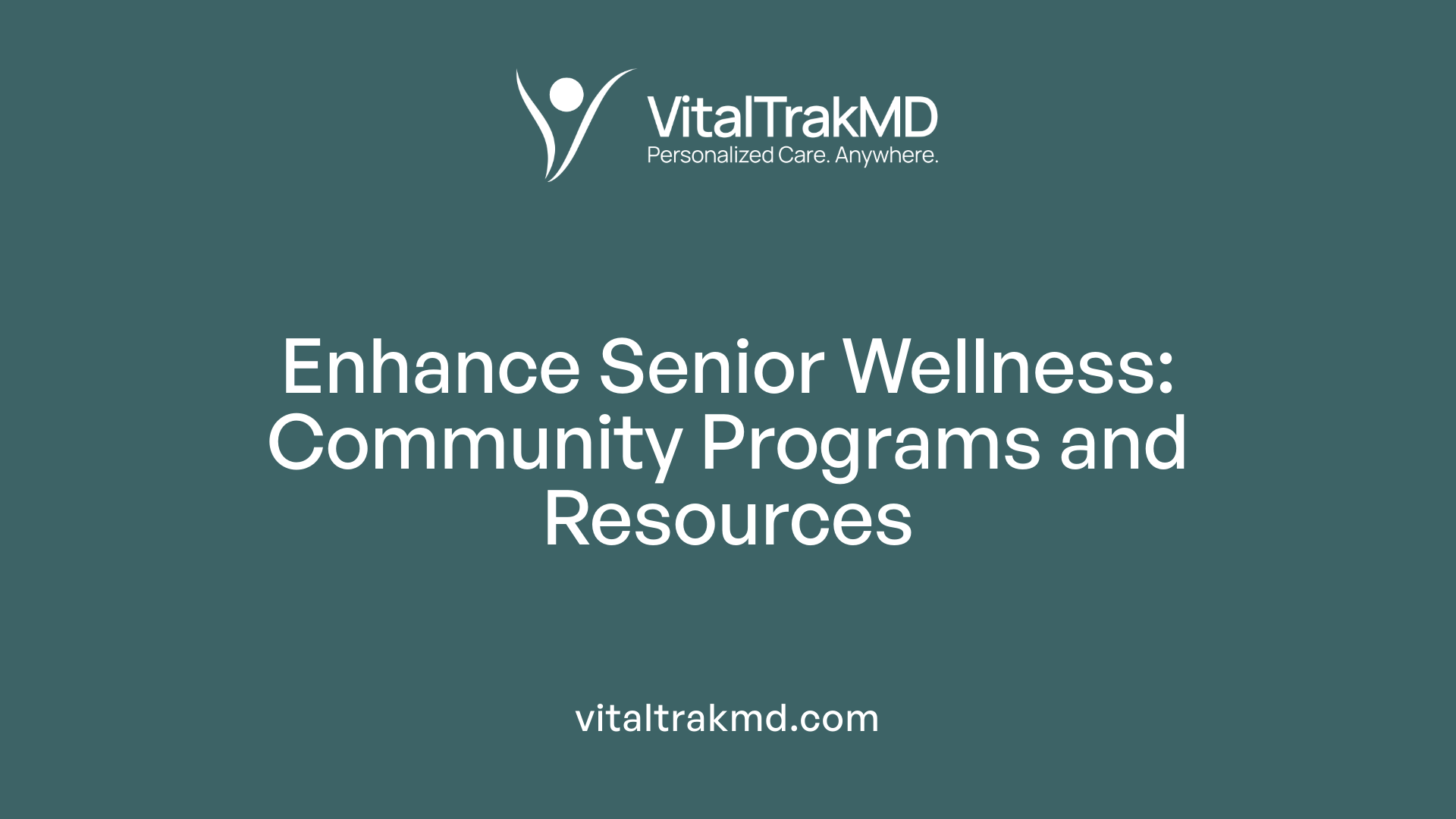Supporting Seniors in Navigating Multiple Care Providers

Understanding the Importance of Navigating Multiple Care Providers for Seniors
As the aging population grows, seniors often face complex healthcare needs involving multiple providers from a variety of specialties. Navigating this intricate landscape requires coordinated care models and robust support systems that integrate medical, mental, and social services. This article explores how multidisciplinary care teams and tailored wellness programs empower seniors to manage their health effectively, foster independence, and enhance their quality of life.
Collaborative Care Models: A Holistic Approach to Senior Health

What are collaborative care models and who makes up the teams?
Collaborative care models bring together a diverse group of healthcare professionals to manage senior health comprehensively. These teams typically include primary care physicians, nurses, mental health providers, pharmacists, and social workers. Together, they coordinate efforts to address the complex needs of older adults.
How do collaborative care models improve health outcomes for seniors?
By combining expertise from multiple disciplines, collaborative care ensures that every aspect of senior health is covered. Mental health support, chronic disease management, and preventive screenings are integrated to promote better overall well-being. This comprehensive attention helps catch health issues early and manage existing conditions effectively, leading to improved health outcomes.
What role does communication play in collaborative care models?
Strong communication among team members is fundamental in these models. Enhanced exchange of information reduces common medical errors such as medication mistakes and mishandling during patient transitions. Reliable data sharing also lowers the likelihood of unnecessary repeat tests or procedures, making care delivery safer and more efficient.
How do collaborative care models reduce healthcare costs?
Through better coordination and communication, duplicate services and redundant testing are minimized. This efficient use of resources not only streamlines care but also significantly reduces healthcare expenses. Patients benefit from timely, appropriate interventions while the system avoids wasteful spending.
Integrating Wellness and Chronic Disease Management in Senior Care

What Are the Most Effective Wellness Programs for Weight Loss?
Effective weight loss programs for seniors blend nutrition, physical activity, behavioral support, and medical guidance. For example, the University of Michigan Health’s Weight Navigation Program offers personalized plans based on thorough health assessments, medical history, and patient preferences. This tailored approach helps individuals adopt sustainable lifestyle changes.
Preventive Healthcare and Regular Screenings
Collaborative care models prioritize preventive health by ensuring seniors receive routine screenings for conditions like hypertension, diabetes, and cancer. Early detection through these screenings enables timely treatment and helps reduce complications, hospitalizations, and healthcare costs.
Lifestyle Education for Healthy Habits
Educating seniors about nutrition, physical activity, and other healthy habits is crucial. Programs emphasize chef-prepared balanced meals and provide information on smoking cessation and stress management. Empowering seniors to participate actively in decisions regarding their care improves engagement and outcomes.
Comprehensive Management of Chronic Diseases
Managing chronic conditions effectively requires coordinated care that includes medication management, regular monitoring, and personalized health plans. Collaborative care teams work closely to prevent disease progression and avoid hospital readmissions by addressing physical and emotional needs comprehensively.
Programs Promoting Physical Activity and Nutrition
Activities such as tai chi, yoga, water aerobics, and walking paths promote physical health and flexibility. Community programs like Bingocize combine fun with health education to improve strength, balance, cognition, and social engagement. Nutrition programs focus on balanced meals and healthy eating education to support vitality and weight control.
These integrated wellness strategies, supported by multidisciplinary teams, contribute to better health outcomes, enhance quality of life, and promote independence for seniors.
Empowering Seniors Through Education, Support, and Active Participation

Involvement of Seniors in Decision-Making
Empowering seniors begins by involving them directly in their healthcare decisions. Collaborative care models prioritize seniors' preferences and values, fostering active participation which enhances their confidence and independence. Seniors who feel heard and engaged tend to manage their health more effectively and experience greater satisfaction with care.
Education and Support Systems
Education plays a pivotal role in empowering seniors. Health programs provide essential knowledge about managing chronic conditions, medication use, nutrition, and lifestyle changes. Support systems including family, caregivers, and care coordinators help navigate healthcare options, ensuring seniors have continuity and personalized assistance. This network encourages adherence to treatment and provides emotional reassurance.
Programs for Mental and Social Well-Being
Attention to mental and social wellness is vital. Initiatives such as counseling, mental health education, community activities, and social clubs reduce isolation and boost emotional health. Programs like 'Bingocize' merge social interaction with cognitive engagement, while 'A Matter of Balance' offers practical fall-prevention strategies to maintain safety and confidence.
Spiritual and Cognitive Wellness Initiatives
Holistic wellness includes spiritual and intellectual growth. Senior living communities provide inclusive worship services and spaces for reflection, supporting spiritual needs. Cognitive health is fostered through lifelong learning programs, arts, and creative activities that promote mental agility and emotional engagement.
How Can Care Programs Support Long-Term Weight Management?
Effective weight management programs focus on personalized, evidence-based guidance. For example, programs led by Registered Dietitians teach portion control, food journaling, and promote increased physical activity, empowering seniors to make sustainable lifestyle changes. Integrating mental health support and community engagement helps maintain motivation and adapts strategies over time. Care teams provide continuous education and regular monitoring, which supports lasting weight control and overall health maintenance.
Building Strong Support Networks for Seniors Managing Multiple Providers

How do support systems improve seniors' well-being and safety?
Strong support networks play a crucial role in enhancing seniors' well-being by addressing their physical, emotional, and social needs comprehensively. Regular interaction with family, friends, and community resources helps prevent loneliness and maintain mental health.
Family, friends, home care agencies, and community resources
A senior's support system often includes family members, close friends, home care agencies, and community organizations. These groups offer personalized care, emotional encouragement, and help navigate daily challenges. Community programs and social activities foster engagement and a sense of belonging.
Technology facilitating communication and monitoring
Modern technology supports communication and health monitoring among caregivers and family members. Platforms enabling real-time updates and alerts help coordinate care efforts efficiently. Monitoring systems can detect health changes early, contributing to prompt interventions and safety.
Role of care coordinators and advocates
Care coordinators or advocates assist seniors by overseeing care plans, ensuring clear communication between providers, and aligning services with the senior's preferences. They simplify navigating complex healthcare systems and help synchronize multiple providers’ efforts.
Importance of safety and independence
An effective support network promotes seniors' independence by empowering them to live autonomously while ensuring safety. Supporters identify and mitigate hazards, monitor medications, and support healthy living choices. This comprehensive approach enhances both the quality and security of seniors' lives.
Community and Organizational Programs Enhancing Senior Wellness and Care Navigation

Community-Based Health Education and Evidence-Based Programs
Many organizations provide vital education and resources aimed at improving senior wellness. The National Council on Aging (NCOA), for example, offers workshops focusing on chronic disease self-management such as Diabetes Self-Management (DSMP), Chronic Disease Self-Management (CDSMP), and Chronic Pain Self-Management (CPSMP). These programs teach seniors about healthy eating, medication use, communication with healthcare providers, and managing fatigue and isolation.
Chronic Disease Self-Management and Fall Prevention
Fall prevention is a key aspect of senior health initiatives. Programs like 'A Matter of Balance' introduce practical strategies and exercises to improve strength and balance, reducing fall risks. Additionally, Bingocize combines bingo with activities designed to enhance strength, gait, balance, and cognition while fostering social engagement. Tai Chi classes are also popular, providing gentle exercises that improve posture and muscle strength, accommodating participants with varying mobility levels.
Culturally Relevant Solutions and Outreach
NCOA’s Center for Healthy Aging delivers tailored, culturally sensitive support, ensuring that health education and wellness programs meet diverse seniors' needs. Community Health Workers (CHWs) further enhance outreach by leveraging community trust and lived experience to connect older adults with healthcare services and resources. Initiatives like the Chronic Care Initiative in Durham County and programs assisting formerly incarcerated individuals exemplify inclusive efforts to address specific community challenges.
Examples from National and University Health Initiatives
At the university level, the University of Michigan Health's Weight Navigation Program offers personalized weight management plans developed with input from obesity medicine experts. The program includes comprehensive assessments and collaborates closely with primary care providers to customize treatment options centered on individual health data, preferences, and financial circumstances.
These community and organizational programs collectively bolster the ability of seniors to manage chronic conditions, prevent falls, maintain independence, and connect with appropriate healthcare resources, fostering holistic support and better quality of life.
Towards a Connected, Holistic Future for Senior Care
Supporting seniors as they navigate multiple care providers requires comprehensive, team-based care approaches combined with holistic wellness programs tailored to their unique needs and preferences. Collaborative models effectively coordinate medical, mental, and social services to reduce errors and improve outcomes. Empowerment through education and engagement sustains long-term healthy behaviors such as weight management. Strong support networks and innovative technologies enhance safety and independence while facilitating communication among caregivers. Community-driven initiatives and evidence-based workshops further bolster seniors’ ability to manage chronic conditions and maintain quality of life. By embracing coordinated care and personalized wellness, we can ensure seniors receive the respectful, integrated support they deserve.
References
- Collaborative Care for Seniors: Focusing on Prevention
- A Complete Guide to Senior Health and Wellness
- Collaborative Approaches to Senior Wellness: The Power ...
- Healthy Aging Programs
- Aging Adults' Preferences for Wellness Program Activities ...
- Health & Wellness Workshops -
- Durham County | Chronic Care Initiative Programs
- Weight Navigation Program
- The 5 Best Weight Loss Programs in 2025
Recent articles
Want to Feel Better and Live Healthier?
Join hundreds of patients taking control of their health with personalized care that fits their life – not the other way around.
Rated 4.8/5 by 32+ customers







